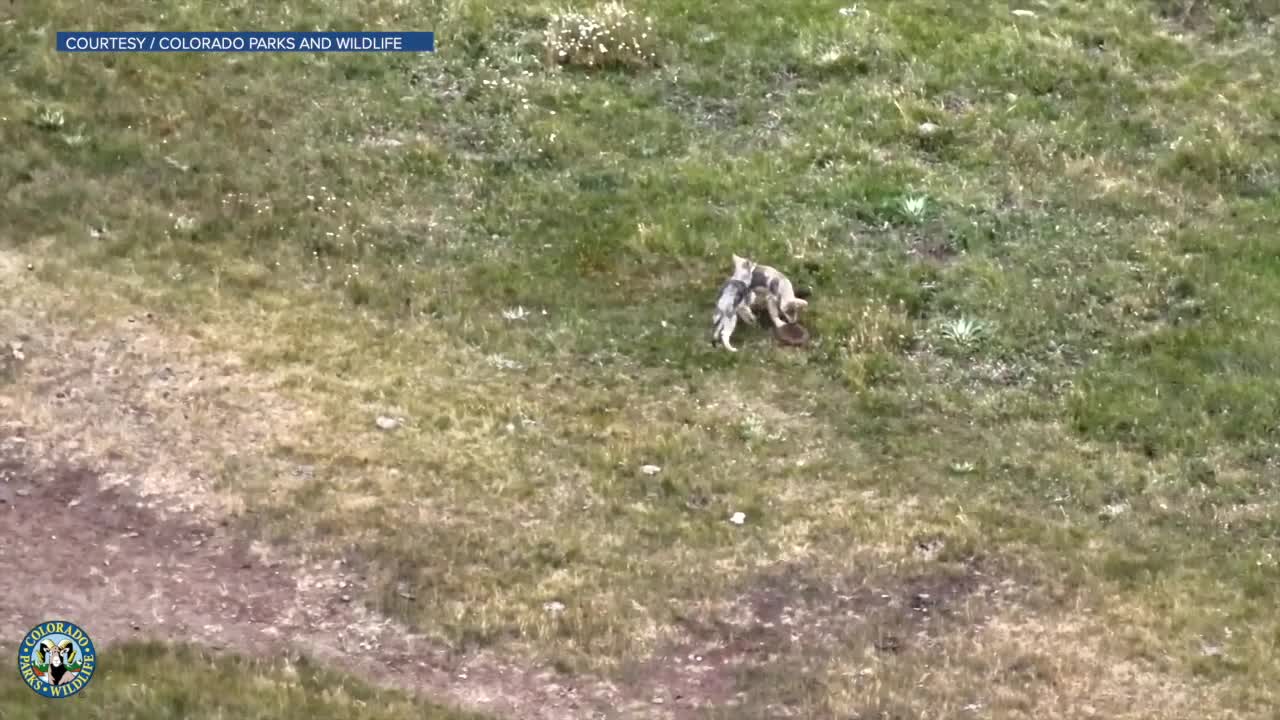DENVER — One of Colorado’s newest wolf packs has added at least six new members to its ranks, state wildlife officials confirmed Tuesday.
Denver7’s Stephanie Butzer was first to report earlier this month that besides the controversial Copper Creek Pack in Pitkin County, Colorado was now home to three additional wolf packs as of mid-July: The One Ear Pack in Jackson County, the King Mountain Pack in Routt County, and the Three Creeks Pack in Rio Blanco County.
The confirmed sightings of the new pups announced Tuesday by CPW officials belong to the Jackson County pack.
“This additional confirmation of successful gray wolf reproduction in Colorado is an important milestone in restoration efforts as we work to establish a self-sustaining wolf population,” said Jeff Davis, director of Colorado Parks and Wildlife, in a prepared statement.
The number of pups may be greater, however, as their size, use of densely covered homesites, and how much time the pups spend underground makes it challenging for state wildlife officials to get an accurate count, said Eric Odell, the agency's wolf conservation program manager.
- State wildlife officials shared video of the pups playing around in Jackson County, which you can watch in the player below:
Speaking to Denver7 in May, Brenna Cassidy, CPW's wolf monitoring and data coordinator, said wolf dens are typically in the ground, secluded and near water.
Female gray wolves can give birth to an average litter of four to six pups, according to CPW's Luke Perkins said. After a month or so though, those pups may start exploring just outside of their den without venturing too far.
A few months after they are born, typically in late June or July, they'll move with their mother to a rendezvous site, which serves as a den site without a hole in the ground, Cassidy told Denver7.
Shortly after that happens, they’ll start traveling with the rest of the pack. But not all will make it in the wild.
“Pup survival in the wild varies widely by location and is difficult to study, but rough estimates place survival rates for the first year at between 50 and 60 percent,” according to Perkins, who said gray wolves live an average of 3-4 years.
In the announcement Tuesday, Perkins reminded residents that intentional disruption of any pack is considered harassment and perpetrators will be subject to fines.
“Additionally, Colorado’s wolf packs may be residing on privately owned lands. Going onto private lands without getting permission first is considered trespassing which is subject to punishment by the local jurisdiction,” he said.
Colorado saw its first confirmed wolf pups since the 1940s in June 2021. A second litter was confirmed three years later after reintroduced wolves from Oregon successfully mated, and shortly after that, a small group of wolf pups were spotted playing along a dirt road in Grand County. More recently, trail cam video showed wolf pups from the King Mountain Pack in Routt County playing around their rendezvous site.
Perkins said CPW continues to monitor these four recognized packs “as well as other wolves in the state.”
- Denver7 has been following Colorado's wolf reintroduction program since the very beginning, and you can explore all of that reporting in the timeline below. The timeline starts with our most recent story.





Denver7 is committed to making a difference in our community by standing up for what's right, listening, lending a helping hand and following through on promises. See that work in action, in the videos above.




